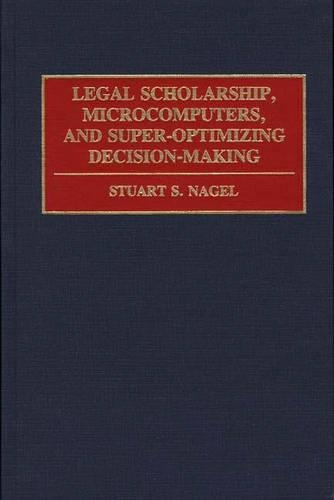
Legal Scholarship, Microcomputers, and Super-Optimizing Decision-Making
(Hardback)
Publishing Details
Legal Scholarship, Microcomputers, and Super-Optimizing Decision-Making
By (Author) Stuart S. Nagel
Bloomsbury Publishing PLC
Praeger Publishers Inc
30th October 1993
United States
Classifications
Tertiary Education
Non Fiction
Computer science
340.0285
Physical Properties
Hardback
232
Description
An exciting aspect of contemporary legal scholarship is a concern for law from a global perspective across all legal fields. The book draws upon examples from North America, Western Europe, Africa, Asia, Eastern Europe, and Latin America. It refers to the basic private law fields of torts, property, contracts, and family law. It also refers to the basic public law fields of constitutional law, administrative law, criminal law, and international law. It analyzes diverse legal policy problems from a perspective that is designed to produce solutions whereby conservatives, liberals, and other major viewpoints can all come out ahead of their best initial expectations simultaneously. Such solutions can be considered an important part of an innovative concept of justice that emphasizes being effective, efficient, and equitable simultaneously, rather than compromising on any of those justice components. Another exciting aspect of contemporary legal scholarship is a concern for the use of modern technology in the form of microcomputer software that can be helpful in law teaching, practice, and research. Computer-aided instruction can supplement the case method by using what-if analysis to make changes in the goals to be achieved, alternative decisions available for achieving them, the factual relations, and other inputs to see how the decisions might change with changes in those inputs. Computer-aided law practice can be helpful in counseling, negotiation, mediation, case analysis, legal policy evaluation, and advocacy. Computer-aided research can be helpful in testing deductive or statistical models to determine how well they can explain variance across the judicial process or other legal processes.
Author Bio
STUART S. NAGEL is a Professor of Political Science at the Univesity of Illinois and a member of the Illinois bar. He is the author of The Legal Process and Super-Optimum Solutions (Quorum Books, 1993) and Decision-Aiding Software and Legal Decision-Making: A Guide to Skill and Applications throughout the Law (Quorum Books, 1990), and the editor of Law, Decision-Making, and Microcomputers: Cross-National Perspectives (Quorum Books, 1991) and Public Administration and Decision-Aiding Software: Improving Procedure and Substance (Greenwood Press, 1990). He has been an attorney to the United States Senate Judiciary Committee, the National Labor Relations Board, and the Legal Services Corporation. He has also been a special master to the Federal District Courts. He is active as a workshop instructor of courses sponsored by the ABA Judicial Administration Division and the American Law Institute.
